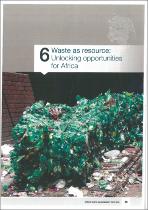JavaScript is disabled for your browser. Some features of this site may not work without it.
- ResearchSpace
- →
- Research Publications/Outputs
- →
- Book Chapters
- →
- View Item
| dc.contributor.author |
Oelofse, Suzanna HH

|
|
| dc.contributor.author |
Nahman, Anton

|
|
| dc.contributor.author |
Godfrey, Linda K

|
|
| dc.date.accessioned | 2018-06-18T08:00:04Z | |
| dc.date.available | 2018-06-18T08:00:04Z | |
| dc.date.issued | 2018-06 | |
| dc.identifier.citation | Oelofse, S.H.H., Nahman, A. and Godfrey, L.K. 2018. Waste as resource: Unlocking opportunities for Africa. Africa Waste Management Outlook, Nairobi: United Nations Environment Programme, pp. 99-116 | en_US |
| dc.identifier.isbn | 978-92-807-3704-2 | |
| dc.identifier.uri | https://www.csir.co.za/sites/default/files/Documents/Africa%20WMO%20Report_final.pdf | |
| dc.identifier.uri | http://wedocs.unep.org/handle/20.500.11822/25514 | |
| dc.identifier.uri | http://hdl.handle.net/10204/10267 | |
| dc.description | Chapter published in Africa Waste Management Outlook. 2018. Nairobi: United Nations Environment Programme | en_US |
| dc.description.abstract | The global waste sector is undergoing a paradigm shift from “waste” to that of “secondary resource” within the vision of a circular global economy. The circular economy emphasizes keeping resources in use for as long as possible through re-use, recycling and recovery of materials. This chapter focuses on understanding the economic and social opportunities in waste that could potentially be unlocked in Africa, and how these opportunities can be used as lever to overcome the challenges in solid waste management on the continent. It covers (i) economic opportunities in waste as a resource (i.e. the economic value of waste as an input to downstream economic activities); (ii) social opportunities, including social benefits (job creation), poverty alleviation, enterprise development and integration of the informal sector; (iii) regional approaches to secondary resource management; (iv) waste trading; and (v) resource crime. It aims to estimate the intrinsic value of waste as a resource in Africa and the associated economic and social benefits that could potentially be unlocked for Africa through increased waste recovery and recycling. It also touches on Africa’s role within the global waste management system. | en_US |
| dc.language.iso | en | en_US |
| dc.publisher | United Nations Environment Programme | en_US |
| dc.relation.ispartofseries | Worklist;20980 | |
| dc.subject | Circular economy | en_US |
| dc.subject | Waste management | en_US |
| dc.subject | Secondary resource management | en_US |
| dc.title | Waste as resource: Unlocking opportunities for Africa | en_US |
| dc.type | Book Chapter | en_US |
| dc.identifier.apacitation | Oelofse, S. H., Nahman, A., & Godfrey, L. K. (2018). Waste as resource: Unlocking opportunities for Africa., <i>Worklist;20980</i> United Nations Environment Programme. http://hdl.handle.net/10204/10267 | en_ZA |
| dc.identifier.chicagocitation | Oelofse, Suzanna HH, Anton Nahman, and Linda K Godfrey. "Waste as resource: Unlocking opportunities for Africa" In <i>WORKLIST;20980</i>, n.p.: United Nations Environment Programme. 2018. http://hdl.handle.net/10204/10267. | en_ZA |
| dc.identifier.vancouvercitation | Oelofse SH, Nahman A, Godfrey LK. Waste as resource: Unlocking opportunities for Africa.. Worklist;20980. [place unknown]: United Nations Environment Programme; 2018. [cited yyyy month dd]. http://hdl.handle.net/10204/10267. | en_ZA |
| dc.identifier.ris | TY - Book Chapter AU - Oelofse, Suzanna HH AU - Nahman, Anton AU - Godfrey, Linda K AB - The global waste sector is undergoing a paradigm shift from “waste” to that of “secondary resource” within the vision of a circular global economy. The circular economy emphasizes keeping resources in use for as long as possible through re-use, recycling and recovery of materials. This chapter focuses on understanding the economic and social opportunities in waste that could potentially be unlocked in Africa, and how these opportunities can be used as lever to overcome the challenges in solid waste management on the continent. It covers (i) economic opportunities in waste as a resource (i.e. the economic value of waste as an input to downstream economic activities); (ii) social opportunities, including social benefits (job creation), poverty alleviation, enterprise development and integration of the informal sector; (iii) regional approaches to secondary resource management; (iv) waste trading; and (v) resource crime. It aims to estimate the intrinsic value of waste as a resource in Africa and the associated economic and social benefits that could potentially be unlocked for Africa through increased waste recovery and recycling. It also touches on Africa’s role within the global waste management system. DA - 2018-06 DB - ResearchSpace DP - CSIR KW - Circular economy KW - Waste management KW - Secondary resource management LK - https://researchspace.csir.co.za PY - 2018 SM - 978-92-807-3704-2 T1 - Waste as resource: Unlocking opportunities for Africa TI - Waste as resource: Unlocking opportunities for Africa UR - http://hdl.handle.net/10204/10267 ER - | en_ZA |






